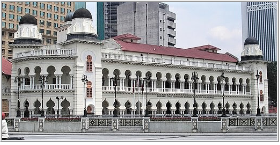Legal clarity remains elusive.By Our Southeast Asia Correspondent
 February 28, 2018 (Morning Star News) – In the wake of the highest court in Malaysia refusing to hear an appeal by four Christians wanting to officially convert out of Islam, Christian leaders continued to hold hope for change.
February 28, 2018 (Morning Star News) – In the wake of the highest court in Malaysia refusing to hear an appeal by four Christians wanting to officially convert out of Islam, Christian leaders continued to hold hope for change.
In a country where there is no legal way to leave Islam, the four people were asking the Federal Court to have their names and their faith changed on their national identity cards. On Tuesday(Feb. 27) the court held that the four people were Muslims and hence fell under the jurisdiction of the Sharia (Islamic law) Court system, and that it must adjudicate matters of Islamic law.
The five-member panel of the Federal Court unanimously ruled that civil courts had no jurisdiction to decide on apostasy cases. The four converts held that the Shariah Courts had no power to decide apostasy cases under state laws because they are no longer Muslims.
Court of Appeal President Zulkefli Ahmad Makinudin wrote that although no such legal provision for deciding apostasy cases existed in the law, there were clauses in it that Shariah Courts could apply.
The Federal Court decision helps clear up a gray area in apostasy cases in Malaysia, but bewilderment remains as Shariah Courts are state courts subject to different state laws. Furthermore, the Federal Court ruled in January that the federal civil court has the final say on legal matters even as they pertain to Muslims.
Hence after the verdict, Joshua Baru, son of the four converts’ attorney, Baru Bian, said the decision “seems to suggest a double standard of the jurisdiction of the civil courts and the interpretation of [the federal constitution].”
Christian leaders, meantime, held out hope. The Metropolitan Archbishop of Kuching, capital of Sarawak state, Simon Peter Poh Hoon Seng, issued a statement asserting Christians should not give up.
“Next, we should pray that the lawmakers will table a just law to face this issue,” Poh said. “Do not lose hope. By the way, I was at the court hearing yesterday, and I testify that the judges were very neutral and fair. Pray, continue to pray. With God, nothing is impossible.’”
Gracious words amid the emotions that ran high on all sides; the Malaysian Insight noted that the archbishop was indeed present at the hearing, and then was heckled by demonstrators trying to jostle him as he exited the court.
At the same time, Christian organizations, including the Association of Churches in Sarawak, have reportedly appointed senior lawyers Leonard Shim and Libat Langub as amicus curae(friends of the court) to monitor their interests. The Sarawak Dayak Iban Association, which represents the state’s largest ethnic group, and the Methodist Church in Malaysia, the Sarawak Ministers Fellowship and the Sarawak Evangelical Churches Association have appointed lawyers to hold a watching brief.
Three of the four appellants were raised as Christians but converted to Islam in order to marry Muslims. Jenny Peter divorced her Muslim husband in 2006 and returned to Christianity. Salina Jau was divorced by her Muslim husband in 1992, and then she returned to Christianity. Tiong Choo Ting began to practice Christianity after his Muslim wife died in 2007. All three signed “statutory declarations” that they intended to return to Christianity.
The fourth person, Syarifah Nooraffyzza, is an ethnic Malay raised as a Muslim. According to the Malaysian Constitution, all ethnic Malays are Muslims – a principle upheld in the case of Lina Joy, who was denied her right to leave Islam in 2007 and convert to Christianity. Syarifah filed a document stating that she no longer practices Islam, and she was baptized in 2009, according to published reports. She is asking to change her identity card from Muslim to Christian and to change her name to Vanessa Elizabeth.
She as well as the other three people are “still Muslims on papers,” according to an appeals court. For the moment, they must take their cases back to Sharia Court to try to get letters of apostasy.

